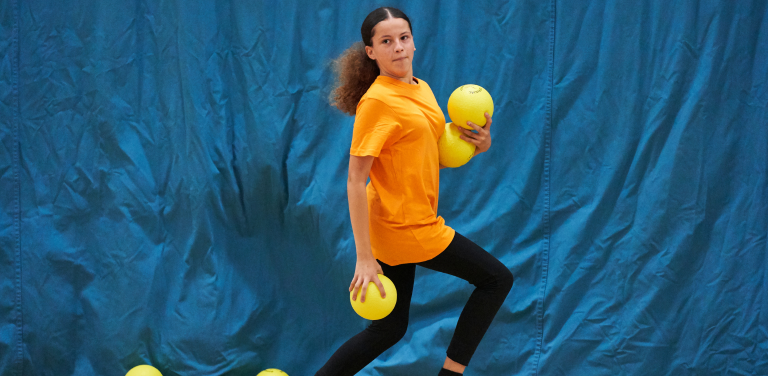Reading time: 4 minutes
Written by Wendy | Leap Project Officer and Administrator
‘Village’ more important than ever
There is a well known saying that, ‘It takes a village to raise a child’ and whilst society has changed dramatically since the origins of that ancient proverb, the meaning has as much value now as it ever has.
After 2 years in a global pandemic, we are facing a mental health crisis, and part of the solution is ensuring we have support networks; communities where we can check in on one another.
Support is particularly important for young people, and activity sessions can provide part of the ‘village’ that can listen to and nurture young people at a time when they need it most.
Hearing first-hand what will help
If you are a parent or carer, you spend a lot of time thinking about what your children want or need and the same is true when you are coaching an activity session. However, in both situations it’s easy to make assumptions without asking young people their viewpoint.
That is why I was excited to attend a workforce webinar run by Mind, to hear first-hand from young people how valuable coaches can be in supporting their participants’ mental health. The webinar was led by a steering group of young people who worked together for 12 months between April 2021 and March 2022.
Research shared in the webinar showed how physical activity for young people helps to reduce stress, improves sleep, lifts self- esteem, improved mood and lowers risk of depression.
A compassionate ear
I was fascinated to hear from the steering group that young people are more likely to speak to coaches as opposed to family and friends. Potentially because they see coaches as a neutral party, someone that will not judge but is a constant in their lives.
When asked the young people said what they wanted coaches to do:
- Be more willing to engage in a conversation with young people about their wellbeing
- Know where to signpost young people to for mental health support
- Continue to increase their knowledge on mental health and wellbeing
- To consider issues affecting young people today
Shaping positive conversations
Young people from Mind’s steering group co-produced the following tips and suggestions to help you support them during your sessions.
Young person focused: Find out what each young person wants to get out of a session. Allow them time to set achieveable goals and review regularly so they can reflect on their progress and personal achievements.
Observe: Observe and listen, before during and after a session, to spot
changes in a young person’s behaviour. Focus on their thoughts and
feelings.
Understand: Aim to better understand mental health problems that
affect young people. Learn more about key issues young people face,
such as discrimination, body image or the impact of social media.
Non-judgemental questions: When checking-in, avoid closed or intrusive
questions. Instead use open, non-judgemental language. For example,
“Is there anything you’d like support with, or is there anything I can do to help?”.
Give encouragement: Don’t force or suggest a particular course of action.
Empower the young person to make their own decision by signposting
them to a range of options they can choose from. For example, “Would you like some more support or can I point you in the direction of some options?”.
Personalise: Everyone is different and has different experiences of mental
health. Put young people first by tailoring and personalising your
sessions to meet their individual needs.
Engage: Follow up with young people you have offered signposting
guidance to. You may not have all the answers but checking-in reminds
a young person you’re there.
Openness: Normalise talking about mental health. Make time to warm up
and cool down mentally, in the same way we do physically. For example,
get young people thinking about how they’re feeling by asking them to
describe their feelings in one word or an emoji. Make this optional so they
don’t feel pressured.
Praise: Focus on positive progress. Avoid shaming or comparing young
people. Instead celebrate wins however small they may be. A young
person may have missed a catch but you could praise their positioning,
or how they judged where the ball was going.
Learn: Get feedback. Ask how you can make sessions more welcoming
and wellbeing focused. Check how young people would like to be
supported. Invite a group to help create or adapt a session plan.
Enjoyment: Make sessions fun and adapt activities so every young
person can experience the positive impact of physical activity.
Focus on enjoyment and how each individual feels.
Support for coaches
There was also some interesting feedback from coaches, centred around the challenges, concerns and fears that they have about the subject of mental health with young people:
- Knowing where to signpost for support
- A fear of giving the wrong advice
- How to practically adapt a session
- A lack of external support services
- Young people not being able to communicate when struggling
The session provided a great website called Hub of hope www.hubofhope.co.uk this is a great tool that uses a postcode search for hat services are available in that area.
Mind have created a Coach Handbook, if you would like to pilot physical copies of these handbooks at your club or organisation, please email sport@mind.org.uk
If you want to learn more about this subject from the people at Mind please click on the links below
Mind – Mental Health and Physical Activity Toolkit
Mind – Supporting young people during physical activity






